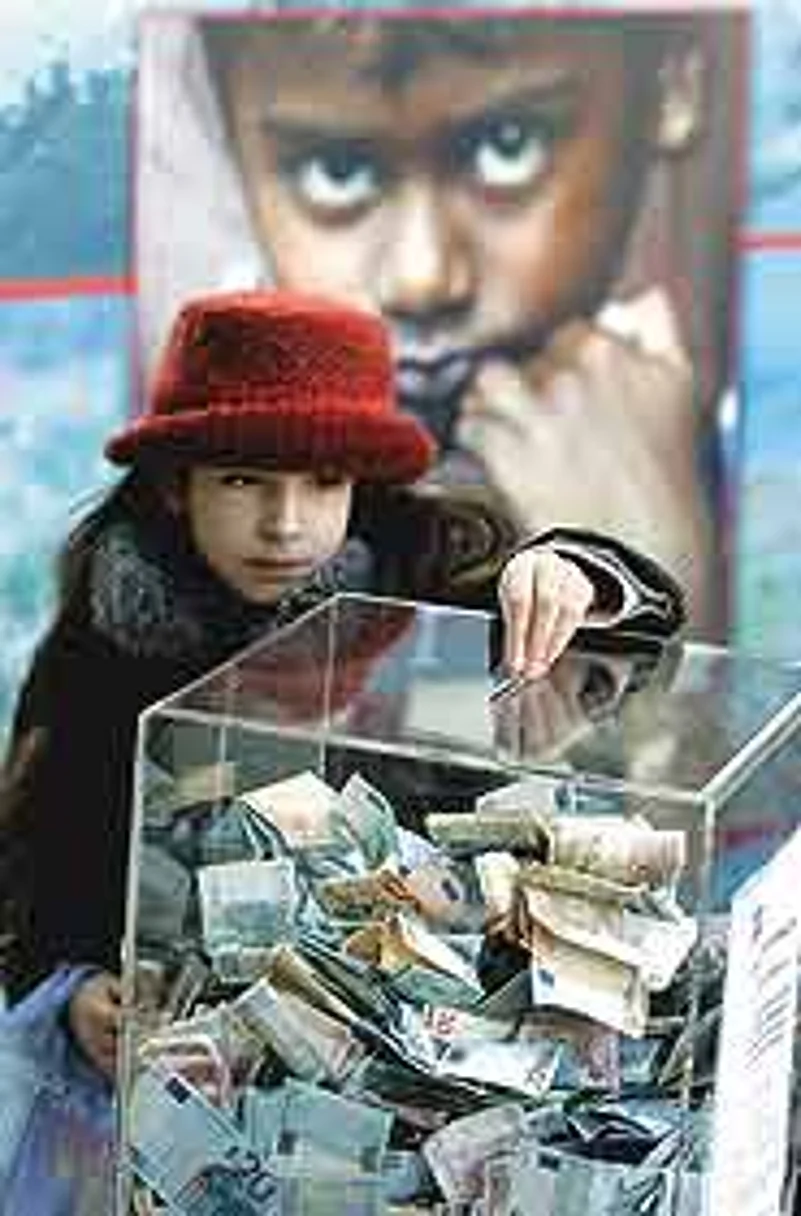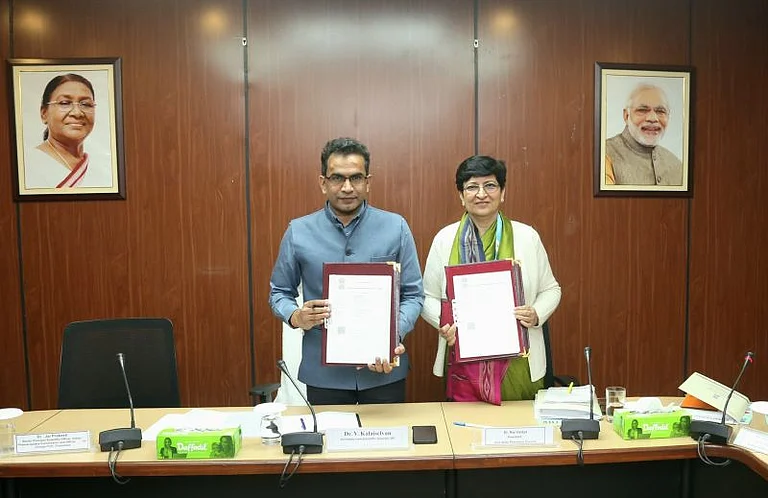
Americans have given more than $340 million and counting in private donations to the tsunami victims. From school-children shovelling snow and forgoing birthday parties to grandmas organising impromptu fundraisers, from schools selling bracelets to amazon.com telling customers to donate to the Red Cross—Americans have tried to weave a web of succour in the greatest outpouring of sympathy and dollars for a disaster in distant lands. And it’s come in small sums, sometimes even in plastic bags filled with one dollar bills from roadside hot chocolate stands manned by children. Celebrities are pitching in. From Eric Clapton to Madonna, Norah Jones to Uma Thurman. George Clooney will do a "telethon", Sandra Bullock donated $1 million to the Red Cross, and Steven Spielberg gave $1.3 million to three relief agencies.
It took President George Bush, vacationing on his Texas ranch, three days to make a public statement and a little more to raise the initial US pledge from $15 million to $350 million while edgily fielding charges of the West’s "stingy" response. His advisors proved once again they didn’t have the touch nor the grace. Later, Bush made a personal donation of $10,000 and went to the embassies of India, Sri Lanka, Indonesia and Thailand to sign the condolence books. But there are no efforts to tone down his inauguration on January 20—a $40 million-affair—to show respect for the more than 1,50,000 dead and 5 million left homeless across 12 countries. Many Americans, including children, have either postponed or abandoned their birthday and anniversary celebrations.
The average Joe and Jane have spoken from the heart. The reasons for the Americans’ overwhelming response are many—nature’s wrath was unleashed a day after Christmas, families were together as they watched the tsunami tear apart millions of families on other shores, a desire to show the Americans care even as their government launches wars, the sheer scale and scope of the tragedy, the huge numbers of children left orphaned, a sense that the wealthiest nation needs to share, a strong post-9/11 empathy with victims of a calamity. "Since 9/11, Americans for the first time understand that this traumatic situation can happen in an instant and change lives forever. They feel a connection," says Jackie Larner, a social worker and a professor at the University of Denver. She said the US media’s focus on the tsunami orphans went straight to the American heart.
Arie Kruglanski, professor of psychology at the University of Maryland, agrees, saying the disaster "really hit hard our humanitarian nerve". He, however, also points to the tough side America has, "reserved for those it perceives as its enemies. It’s not exactly a disconnect but rather two manifestations of an essentially passionate and idealistic American nature. Americans as a whole are rarely cynical and world-weary and that’s why they are sometimes perceived as ‘naive’".
So why haven’t they been outraged by the Iraq war which may have killed as many as 1,00,000 Iraqis? Shelley Correll, professor of sociology at Cornell, says there is no footage of the Iraqi dead on TV screens. "Americans have not seen the pictures but the tsunami was very visual." For once, the US media were "almost shamed" into covering the deaths of other people rather than focus on how many Americans had died—a leitmotif of US disaster reporting". It would have taken a lot of audacity to talk about 18 American deaths in the tsunami against the massive numbers of deaths in other countries," Correll says. Then there was the special burden of being the wealthiest nation with the "luxury of enough to give", according to Elaine Hanson, professor of psychology at the University of Denver. "It was appalling to many Americans that Bush took three days to respond to the massive loss of life," she says. Larner says she hopes the Bush administration was shamed into a better response. Underlying many comments is a strong desire by the people to be seen as separate from their government.
Next to the Americans, the British opened their hearts and wallets. A week after the tsunami, Britons were donating close to $2 million an hour, averaging more than most others. British charities concentrated their efforts through the Disasters Emergency Committee (DEC) comprising 12 leading charities. As a result, they drew effective media support which meant that one number hit viewers on prime-time television. "This is our 51st appeal since 1963 and the most successful so far," Tricia O’Rourke of the DEC said. The British have already raised more than $200 million with the government promising to match the amount.
At an Oxfam store in north London, an elderly woman queuing up in the cold explains her reasons for giving. "It’s the sea, my dear. In this country, we grow up with the sea. It is our history, we have been such a country of seafarers. When people are killed by the sea, I feel it in my old bones," she says. And the British outpouring of support came well before present estimates that up to 450 Britons might have died in the disaster became known. In France, official and private contributions had reached $160 million by mid-week. The Italian government offered $150 million while the Germans announced $674 million, mainly for reconstruction.
But it is the feeling behind the donations more than the hard sums that’s being counted. Beslan, which lost more than 350 people, many of them children, in a terrorist siege of a school last September, donated one million roubles ($35,000) for the tsunami survivors. "Beslan residents will never forget how the world responded to our tragedy," says Mairbek Tuayev, head of the local city council.
Once the scale of the calamity dawned on Western governments, a virtual bidding war erupted which some said was coloured by geo-politics. The Japanese upped the ante by announcing a $500 million donation, sparking a one-upmanship of pledges. China could never touch that figure. The German government’s pledge of $674 million triggered questions about where it would find even a $100 million from a bursting budget. Would it rob Peter to pay Paul, take money away from Sudan to help Sri Lanka? Currently, the league of donors is topped by Australia with a pledge of $810 million. Unseemly though it was with countries jockeying for influence, in the end relief agencies were heartened. "Competitive compassion is better than no compassion," says Jan Egeland, the top UN relief administrator.
Maryland University’s Kruglanski says in today’s interconnected world, people are now more affected by others’ pain. He says that just as the butterfly effect in Chaos Theory, where the butterfly’s flapping wings are linked to hurricanes and other seemingly unrelated events, events across the globe can touch you. "Global terrorism, the aids epidemic and now the tsunami disaster increasingly mean that we have to look out for each other. This is becoming increasingly clear to thinking people the world over." Hence their response. Yes, sometimes people can lead. And their governments follow.
By Seema Sirohi in Washington and Sanjay Suri in London

























